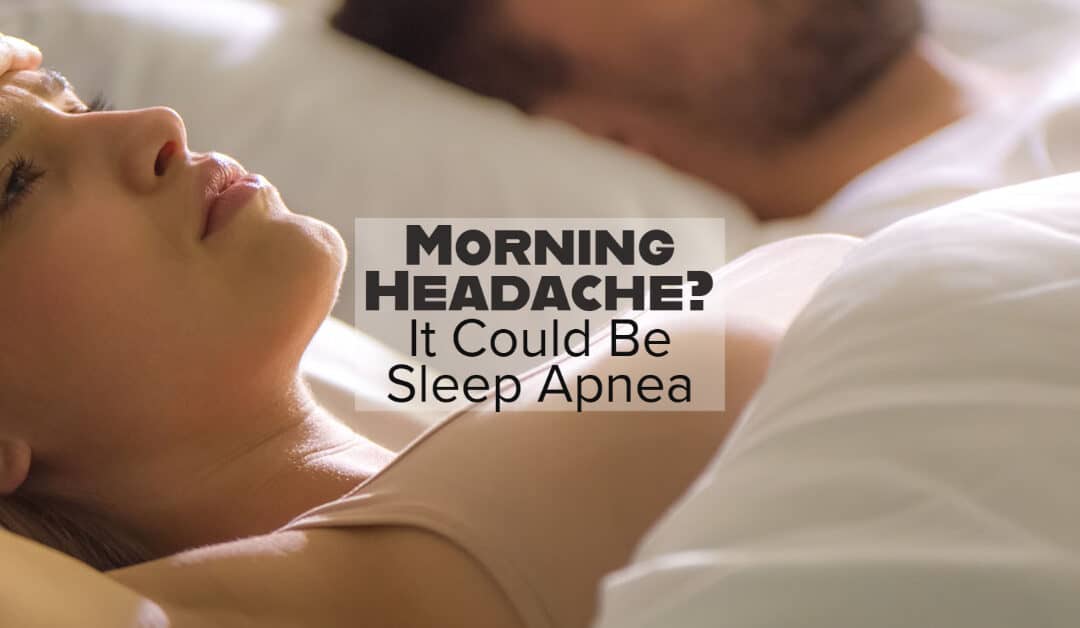Do you wake up with a throbbing headache every morning? If so, it could be due to obstructive sleep apnea. Around 1 in 13 people experience this type of headache caused by a sleep-related breathing disorder. Let’s look at what causes a sleep apnea headache and how to wake up feeling like yourself again.
Obstructive Sleep Apnea & Morning Headache
According to the JAMA Internal Medicine, “Awakening headaches are associated with OSA. These headaches are of brief duration and their occurrence and severity increase with increasing OSA severity. Treatment of OSA with continuous positive airway pressure or uvulopalatopharyngoplasty can reduce these headaches.” In addition, their research shows that:
- Waking up with a headache is traditionally associated with sleep disorders.
- Clinical studies have reported a high association between morning headaches, obstructive sleep apnea syndrome, and snoring.
- Between 18% and 41% of patients with OSAS have experienced headaches upon awakening in the morning.
- The prevalence of morning headaches in the general population is not well known, although, according to a Swedish study, 5% of the population often awakens with headaches.
What is Obstructive Sleep Apnea?
Obstructive sleep apnea (OSA) is a sleep-related breathing disorder that occurs when your throat muscles intermittently relax and block your airway during sleep. The muscle relaxation causes you to snore loudly and also may reduce the amount of oxygen in your blood.
Twenty-two million Americans suffer from sleep apnea. However, 80% of cases remain undiagnosed.
Other Types of Sleep Apnea
There are two types of sleep apnea: central and obstructive. Central sleep apnea may involve a problem with your brain signals, while a physical blockage in your airway causes obstructive sleep apnea. Complex sleep apnea is a combination of the two.
Morning headaches are common in people with obstructive sleep apnea because the blockage in their airway prevents them from getting enough oxygen during sleep. This blockage can cause oxygen deprivation and lead to headaches upon waking up.
Because the other types of sleep apnea also cause a lack of oxygen, you can also suffer from morning headaches. If you think you might suffer from any sleep apnea, it is crucial to see your ENT doctor for a diagnosis.
What are the Risk Factors for Sleep Apnea?
There are several risk factors associated with sleep apnea, including:
- Being overweight or obese
- Having a large neck circumference (>17 inches in men and >16 inches in women)
- Having large tonsils, a large tongue, or a small jaw bone
- Smoking
- Drinking alcohol excessively
- Use of sedatives or tranquilizers
If you’re looking for a natural way to treat sleep apnea, there are some lifestyle changes you can make. For example, losing weight and quitting smoking can help reduce the severity of sleep apnea and improve your overall health. You should also avoid alcohol and sleep on your side to prevent your airway from becoming blocked during sleep.
How is Sleep Apnea Treated?
If you think you may have sleep apnea, the first step is to see your ENT sleep specialist. They will conduct a sleep study to confirm the diagnosis. Once you get a diagnosis of sleep apnea, there are a few different treatment options available.
- Continuous positive airway pressure (CPAP) therapy: A CPAP machine delivers air through a mask worn during sleep. The air pressure keeps your airway open so you can breathe normally.
- Inspire Therapy: a small FDA-approved medical device implanted in a simple procedure. When you turn on the Inspire remote, it stimulates the nerves to open your throat and breathe well while sleeping.
- Oral appliances: These devices look like mouthguards. You wear them during sleep to help keep your airway open. The mouthguard works by bringing your lower jaw or tongue forward.
- Surgery: In some cases, surgery may be necessary to remove excess tissue from the airway or widen the airway. However, this surgery is usually only recommended for people who don’t get relief from sleep apnea headaches with CPAP or Inspire treatment.
If you think you may be suffering from sleep apnea, don’t wait to get help. Talk to your doctor about getting a sleep study and finding the right treatment for you. With proper treatment, you can say goodbye to those pesky morning headaches.
Key Takeaways:
If you’re waking up daily with a headache, it’s time to find answers and relief!
- Sleep disorders like obstructive sleep apnea often cause morning headaches.
- Obstructive sleep apnea is a sleep-related breathing disorder that occurs when your throat muscles intermittently relax and block your airway during sleep.
- If you think you suffer from sleep apnea, talk to your ENT doctor about getting a sleep study and finding the right treatment for you. With proper treatment, you can wake up refreshed and ready for your day!
We Can Help
While sleep apnea headaches can be frustrating, there are treatments available that can help you find relief. If you think you may be suffering from sleep apnea, talk to our sleep specialists at Enticare. Our ENT doctors can help you find the cause of your headaches, whether sleep apnea or something else. We specialize in disorders of the head and neck. Find out why you wake up with a headache and start treatment to feel refreshed and headache-free again.
Sources:

